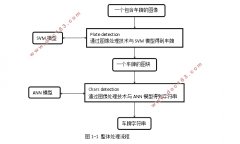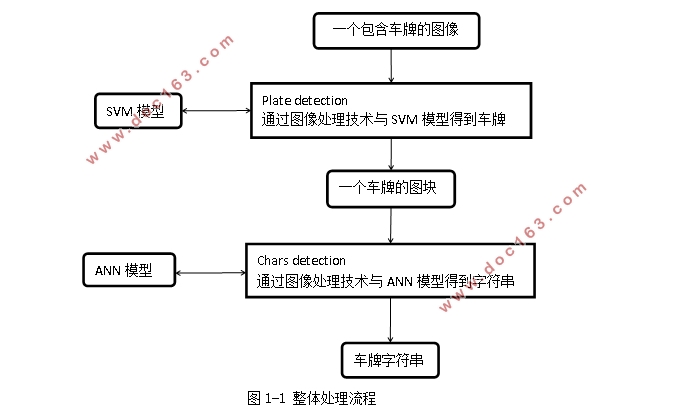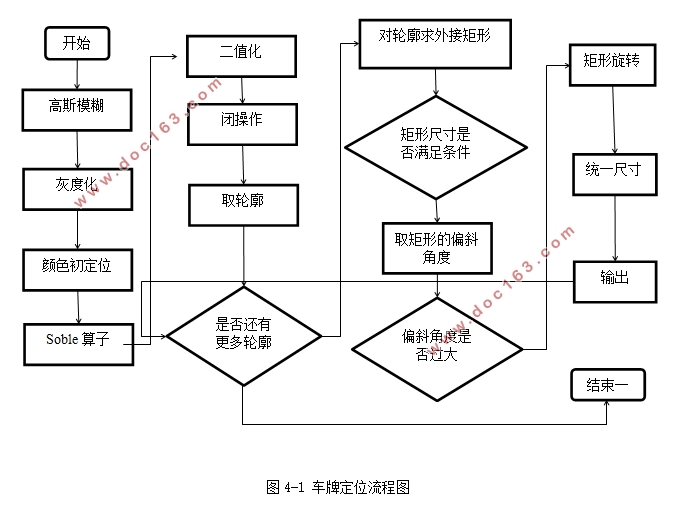基于OpenCV的车牌号识别系统设计

1.无需注册登录,支付后按照提示操作即可获取该资料.
2.资料以网页介绍的为准,下载后不会有水印.资料仅供学习参考之用.
密 惠 保
基于OpenCV的车牌号识别系统设计(论文16200字)
摘 要
随着我国科学技术与经济水平的发展,有能力购买汽车的人也与日俱增,但汽车保有量大幅度地增加给人们带来便捷的同时也制造出了相应的麻烦,对现实生活中的交通运行和车辆管理造成了更大的压力,越来越频繁的交通事故也受到人们的逐渐关注。于是,作为智能交通系统(Intelligent Transportation System)基础的车牌识别技术的研究开发已经迫在眉睫。
本文阐述了一个基于OpenCV的车牌号识别系统的设计与实现的具体过程。论文中将车牌号识别系统划分为车牌定位模块和车牌字符识别模块这两个大模块。车牌定位模块综合了颜色定位和Soble定位两种定位方法。第一步用颜色定位,输出候选车牌到SVM模型,统计被判断为车牌的图块数目,通过这个数目判断是否要继续进行Sobel定位;车牌字符分割模块这个步骤的主要目的就是从上一个车牌检测步骤中获取到的车牌图像,进行光学字符识别(OCR)这个过程,分为字符分割和字符识别两个部分。分割部分采用灰度化与二值化预处理后取外接矩形的方法实现对字符的分割,字符识别部分利用了人工神经网络ANN来识别车牌字符图像。
本文基于计算机视觉库(Open CV),在windows 10系统下以Visual Studio 2010 为开发平台,使用C++语言进行开发。本系统通过对各类车牌图片的测试,显示具有良好的识别效果,可以满足车牌识别系统的要求。 [版权所有:http://think58.com]
关键词:车牌识别 计算机视觉 颜色定位 字符分割
Design and implementation of license plates recognition based on OpenCV
Abstract
With the development of science and technology and economic level in our country, the people that have the ability of buying cars became more and more,but car ownership substantially increases bring convenient at the same time also produced the corresponding trouble,and the management of traffic and vehicles in real life has been created more pressure, people also gradually pay attention to more and more frequent traffic accidents. Then, as the base of ITS (Intelligent Transportation System), the research and development of thelicense plate recognition technology is imminent.
This article expounds the design and implementation of car license plate recognition system based on OpenCV. The author first analyses the system, including feasibility analysis, requirement analysis and system's overall architecture design and the division of various modules.The vehicle license plate recognition system in Papers is divided into two modules including the license plate detection module and the license plate character recognition module. License plate detection module color pinpoint the candidate license plate in the first, then use the SVM model to judge whether the license plate, finally, counting the number. If the license plate positioning has enough quantity that more than the set parameters, we don't need to step after processing. On the contrary, if the quantity is not enough, we should continue the Sobel positioning. This method in the backlight, low contrast and fog in the image also has good positioning effect; The main purpose of the License plate character segmentation module is to do optical character recognition (OCR) on the license plate image that get from a license plate detection, this process can be divided into two parts of character segmentation and character recognition. The Part adopts grayscale and binarization segmentation, and then obtain the external rectangular to achieve the segmentation of the characters. In character recognition, uses the convolutional neural network for the identification of license plate character image.
[资料来源:http://THINK58.com]
This article is based on computer vision library (OpenCV), and developed on Visual Studio 2010 by using C++ language. This system has good recognition effect through the test of all kinds of license plate images, can meet the requirements of license plate recognition system.
Keywords: License plate recognition; computer vision; color positioning; Character segmentation.
[来源:http://think58.com]


目 录
摘 要 I
ABSTRACT II
第一章 绪论 1
1.1 选题背景 1
1.2 国内外研究现状 1
1.3 课题研究的主要内容 2
1.4 论文的结构安排 2
第二章 车牌号识别系统开发相关技术的介绍 4
2.1 OPENCV介绍 4
2.2图像处理方法介绍 4
2.2.1 高斯模糊 4
2.2.2 图像灰度化处理 5
2.2.3 边缘检测 6 [资料来源:http://THINK58.com]
2.2.4 图像二值化处理 8
2.2.5 图像的腐蚀与膨胀 8
2.5 本章小结 11
第三章 系统分析 12
3.1 可行性分析 12
3.2 需求分析 12
3.3 系统硬件设备及操作系统 14
3.4 系统开发平台 14
3.5 系统流程图 14
3.6 本章小结 16
第四章 系统详细设计 17
4.1 车牌检测模块的具体实现 17
4.1.1 车牌定位模块 17
4.1.2 车牌判断模块 21
4.1.3 车牌检测模块 23
4.2 车牌字符识别模块的具体实现 23
4.2.1 字符分隔模块 23
4.2.2 字符鉴别模块 25
4.3 开发过程中遇到的问题与解答 27
4.4 本章小结 28
第五章 系统测试 29
第六章 总结与展望 32
[资料来源:www.THINK58.com]
参考文献 33
致谢 34
[资料来源:http://THINK58.com]
